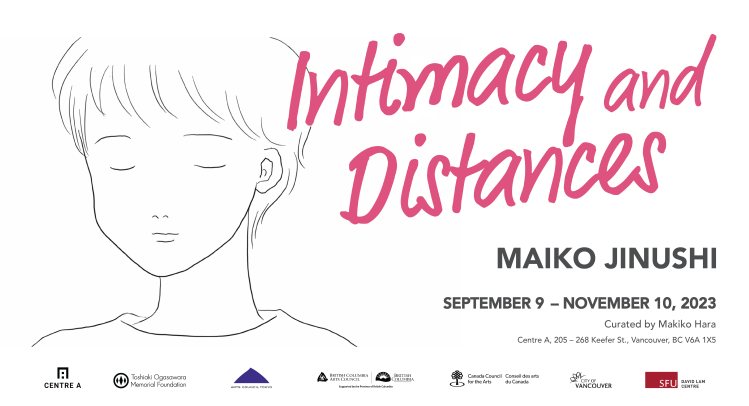Vancouver International Centre for Contemporary Asian Art
Intimacy and Distances
 Intimacy and Distances
Intimacy and Distances
Maiko Jinushi
–
Curated by Makiko Hara
September 9 – November 10, 2023
Opening: September 9, 4 – 6 PM (remarks at 5 PM)
Current Gallery Hours: Wednesday to Saturday, 12 PM – 6 PM*
*Subject to change as per COVID-19-related protocols. Face masks or face coverings are optional during your visit.
–
“Intimacy and Distances, the first solo Canadian exhibition by Tokyo-based interdisciplinary artist Maiko Jinushi, consists of four recent video installations and preliminary drawings. For over a decade, Maiko Jinushi has been creating artworks examining relationships with others in unique ways through dialogue and collaboration with various artists. Using a wide range of media, including drawing, poetry readings, performance, and video installations, and quoting text from novels and poems, the artist describes her art practice of exploring a new way of story-telling as “a visual form of literary experience”.
In this exhibition, the relationship between self and others is unraveled through the seemingly contradictory keywords “Intimacy” and “Distances”, reflecting the physical and emotional distance experienced during the Corona pandemic to explore intimate relationships with others through remote and digital communication.
Six years prior to this exhibition, in 2017, I invited Jinushi to Vancouver to present a new live work for the LIVE International Performance Art Biennial at the Western Front. She collaborated with Vancouver-based sound artist and percussionist John Brennan on a live public video recording performance called Sound of Desires. As an audience member, through the improvisational dialogue between Jinushi and Brennan, the drum sounds, and one’s own attempts to interpret the elements of each, the experience of time and space became fraught with considerable tension and drama, a physical sensation and emotional “energy” of the intimate exchange. How could such dynamic and intimate relationships with others actualize through remote, digital communication?
The works in the Intimacy and Distances exhibition were largely created during the physical and emotional distancing of the recent Covid pandemic. They are experiments reflecting on the experience to explore ways of communicating intimate feelings with others through digital media in post pandemic times.
Lip Wrap / Air Hug / Energy Exchange, a short animation in the first room, is a prologue message depicting the artist’s sense of entrapment, anxiety, and distance from family and friends in the early period of the lock down, describing the desire for a possibility of an exchanging intimate sensation not involving physical contact. The poem was written in pre-pandemic in 2018 as a kind of prescient imagining of near-future human connections in a digital society.
A Detective in Mexico City, quotes, and reinterpretes as looking through smartphones and monitors, the poem “Generation of Electric Eyelids” (in English translation), by Chilean novelist Roberto Bolaño, whom Jinushi often refers to in admiration through her artworks. In a remote collaboration, Jinushi asked a friend in Mexico City to shoot a video of lovers on the street with a smartphone, as if stalking them. Later she revisited the same location, alternating the original footage with scenes in which the lovers were absent. Combined with Bolaño’s poem, grumbling about his ex-lover, the work is structured to cross the gap into multi-layered memories of time and place.
On Telepathy, in the last room, was a pre-pandemic work, but it resonates with the idea of digital exchangeability through cameras and monitors. The invisible exchange of energy emerged between three videographers and Jinushi through the concept of “telepathy”. The invisible power of manipulation can also be interpreted as the mind-control of consciousness through various media in the modern society we live in.
Looking at these works again now that travel is no longer restricted, and social distancing and the wearing of masks have been largely forgotten, we may rethink different impressions. However, they remind us how our current relationship with others has transformed into digital exchangeability through the computer monitor and smartphones. These works appear a reflection of the invisible. Multi-layered exchanges of energy through remote, distanced technology.
Maiko Jinushu’s video works open up a variety of interpretations through poetic fragments of the reality we face in our daily lives. The exhibition, Intimacy and Distances offers a forum for dialogue about how we can reconstruct new relationships between self and others with technology in an uncertain and transforming contemporary society.”
– Makiko Hara
This exhibition is co-presented with Akira Takaishi’s solo exhibition, Place Far Away From Anyone or Anywhere at CSA Space curated by Steven Tong. (Online link, here)
–
Artist Biography
Maiko Jinushi, born 1984 in Kanagawa, Japan. Lives and works in Tokyo. Jinushi obtained her MFA in Painting from Tama Art University in Tokyo, Japan, and recently participated in a residency at the Jan van Eyck Academie in Maastricht, the Netherlands in 2019-20.
Her work has evolved from drawings and novels on themes of personal tales, to the creation of a new form of literary experience that comprehensively combines elements including video, installations, and performances.
In 2017, Jinushi created a performance “Sound of Desires” in collaboration with a sound artist John Brennan at Western Front, Vancouver, for the LIVE International Performance Art Biennale.
Her recent solo exhibitions include “MAM Project 031: Jinushi Maiko” (Mori Art Museum, Tokyo, 2023), “Brain Symphony” (Hospitale Project, Tottori, Art Center Ongoing, Tokyo, 2020), “Sound of Desires” (Hagiwara Projects, Tokyo, 2018). Recent group exhibitions include “Universal / Remote” (Contemporary Art Museum Kumamoto, Kumamoto, 2023), “Till We Meet Again IRL, Best Wishes, Asia-Art-Activism (Co-curated by Annie Jael Kwan, Arianna Mercado, Cuong Pham and Howl Yuan)” (Online, 2020), “The Yebisu International Festival for Art & Alternative Visions” (Tokyo Photographic Art Museum, Tokyo, 2019), “The Ecology of Expression -Remaking Our Relations with the World” (Arts Maebashi, Gunma, 2019), “Zero Gravity” (Matadero Madrid, Madrid, 2015), “Koganecho Bazaar 2014” (Koganecho area, Kanagawa, 2014).
Artist Website: http://maikojinushi.com
Curator Biography
Makiko Hara is an independent curator, lecturer, writer, and art and cultural consultant based in Vancouver, BC. Makiko Hara received The Alvin Balkind Curator’s Prize in 2020. From 2007 to 2013, she was the Chief curator / deputy Director of Centre A —Vancouver International Centre for Contemporary Asian Art. She has worked with many visual artists on a variety of international projects as an independent curator, including: ScotiaBank Nuit Blanche, (Toronto, Canada, 2009), AIR YONAGO, Tottori Geijyu Art Festival (Yonago, Japan, 2014-15), Fictive Communities Asia-Koganecho Bazaar (Yokohama, Japan, 2014), Rock Paper Scissors, and Cindy Mochizuki, (Yonago City Museum of Art, Tottori, Japan, 2018). Hara was appointed to the Advisory director of the International Exchange Center, Akita University of Arts, Akita, Japan in 2017-2020. Hara is a co-founder of Pacific Crossings, BC based curatorial platform since 2018 that has initiated and organized numerous conversations, residency and online /off line cultural exchange across the pacific. Hara founded My Kitchen Anthropology Museum in 2020 in response to the Covid 19 Pandemic lockdown, and held Hank Bull and Marcia Crosby solo exhibitions. Recently Hara was a guest curator for Vancouver Art Gallery’s Offsite and curated Lani Maestro (2022-23) and Pedro Reyes (2023-24).
–
Supported by Arts Council Tokyo (Tokyo Metropolitan Foundation for History and Culture)
Centre A would like to acknowledge the generous support of Canada Council for the Arts, BC Arts Council, and Vancouver City Council, the Simon Fraser University David Lam Centre, and the Toshiaki Ogasawara Memorial Foundation for the realization of this exhibition.
 ________________________________________________________________________________________________________
________________________________________________________________________________________________________
Accessibility: The gallery is wheelchair and walker accessible. If you have specific accessibility needs, please contact us at (604) 683-8326 or [email protected]. Centre A is situated on the unceded territories of the Musqueam, Squamish, and Tsleil-Waututh peoples. We honour, respect, and give thanks to our hosts.






